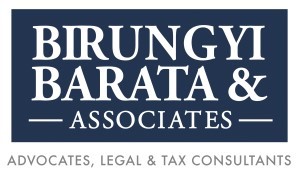

Since 2010, the Global Law Experts annual awards have been celebrating excellence, innovation and performance across the legal communities from around the world.
posted 4 months ago
In the ideal world of a tax policy designer, everyone and almost everything should taxed. It is for this reason that there are so many taxes and tax points. From income taxes which include corporation tax, pay as you earn and withholding tax to import duty, excise duty, VAT, Local service tax, property tax and many others the idea is to leave nothing out.
Tax is rarely enough and is far from enough in the less affluent countries. The pressure to collect more tax is so pervasive. There is a constant drive to amend the tax laws, to collect more tax, to expand the tax base.
From Hut tax, to Graduated tax, Sales tax and VAT the methods of identifying the tax have mirrored the sophistication of society. The hut tax was probably the easiest to collect since the owner of the hut can neither hide it nor deny it. Graduated tax which was abolished not so long ago was largely gender and age based and was renowned for its crude methods.
With the rise of computerization, it was imperative to give taxpayers an identity so that the tax man could keep a trail of the taxpayer and the taxpayer’s transactions. This led to the setting up of rules to capture what later came to be known as the TIN (Tax identification Number). Undeniably, the TIN does not necessarily identify the tax, but it is supposed to keep a digital footprint (or tax print) of the taxpayer. To do this efficiently, it became necessary to enforce registration of taxpayers by denying people or business entities certain facilities if they had no TIN. Without a TIN one couldn’t get a Tax clearance certificate and therefore you could not bid for some contracts, and one could not get a trading license, land title or incorporate a company.
Apart from the TIN, there has been no shortage of initiatives aimed at expanding the tax base. Some of the notable ones include Presumptive tax, Domestic VAT, TREPS, and some outsourcing of services such as the hiring of Ripple Nami and GVG. None of them has been particularly successful. There does not seem to have been a coordinated study as to why these initiatives failed but it is safe to say that many of them failed because they were started more as knee jerk responses than a result of deep analytics.
The EFRIS system (Electronic Receipt and Invoicing System) is one of the more successful initiatives in improving especially the administration not only of VAT but all taxes under the purview of the Uganda Revenue Authority (URA). EFRIS has since contributed a lot to increasing the tracking of transactions between taxpayers who are VAT registered. The system can record the payment and receipt of money between the traders in real time, without the two parties having to declare the transactions to URA.
The success of the EFRIS system is limited to transactions between VAT registered taxpayers yet the VAT threshold for registration is a turnover of sh 150,000,000/ per year ,meaning that those who are not registered for VAT do not have to use EFRIS hence do not charge VAT.
In the bid to put more taxpayers under its radar the URA decided that come 1st July 2025, every taxpayer in the categories listed below must comply with EFRIS and issue tax invoices whatever their turnover.
The businesses covered by this order are;
1. Wholesale and Retail of fuel
2. Mining and Quarrying
3. Manufacturing
4. Electricity, gas, steam, and air conditioning supply
5. Water supply; Sewage, waste management and remediation activities
6. Construction
7. Transportation and storage
8. Accommodation and food service activities
9. Information, technology, and communication
10. Real estate activities
11. Professional, scientific, and technical activities
12. Arts, entertainment, and Recreation
It is questionable whether the order issued by the URA will not get some challenges along the way, because;
It does not meet the legislative threshold
The Constitution requires that every tax be passed by Parliament. There is not law passed by Parliament amending the threshold to register for VAT from Ushs.150m per annum.
Inadequate definitions
A number of the tax heads would need clear definition and preferably some regulations or practice notes. For example;
Transportation and storage
Is the tax applicable where the taxpayer does both transportation and storage or is storage independent from transportation? In the case of transportation will the boda rider expected to ride with a tax invoicing machine?
Waste management
Is it likely that my house maid, who has the obligation to keep my home clean, is engaged in the business of waste management and therefore should issues tax invoices every time she throws out the garbage?
Manufacturing
Does the person engaged in the business of making malwa, tonto, muramba, have to issue tax invoices as a manufacturer?
Arts, entertainment, and Recreation
If a person invites guests, (say for a wedding reception) entertains them with art, music and food, should that person issue VAT invoices ?
The question is why did the URA feel compelled to introduce this measure soon after the amendments in the VAT Act of the year 2025/2026 and not wait for the next round of amendments in the next financial year?
Stay informed with the latest legal developments at Global Law Experts
Author


No results available
posted 40 minutes ago
posted 40 minutes ago
posted 40 minutes ago
posted 41 minutes ago
posted 41 minutes ago
posted 3 days ago
No results available
Find the right Legal Expert for your business
Global Law Experts is dedicated to providing exceptional legal services to clients around the world. With a vast network of highly skilled and experienced lawyers, we are committed to delivering innovative and tailored solutions to meet the diverse needs of our clients in various jurisdictions.

Thinking of buying property in Brazil? Start with a full legal safety net.
✔️ Check title and ownership history
✔️ Verify no debts or disputes
✔️ Confirm zoning and permits.
#BrazilProperty #RealEstateInvesting #LegalDueDiligence #ForeignInvestment #PropertyLaw #GlobalRealEstate #InvestmentRisk #BrazilLaw

When your international business faces financial distress, quick action is key! 🔑 Negotiating with creditors, restructuring debt, and understanding insolvency laws can help regain stability. Global Law Experts is here to guide you through your options.
🌍Explore the details on our website.
🔗Link in bio
#GlobalLawExperts #CommercialLaw #BusinessLaw #LegalAdvice #BusinessGrowth #LegalTips #BusinessStrategy #LegalCompliance #Law #LegalKnowledge #LegalAwareness #Law101 #LegalEducation #IntellectualProperty

Thinking of buying property in Brazil? Don’t stop at the contract or key handover. Make sure the title is officially registered before calling it yours.
#BrazilRealEstate #PropertyLaw #GlobalInvestment #ForeignInvestors #LegalTips #DueDiligence #RealEstateRegistration #SecureInvestment

Getting a termination notice right now? Know your rights. Valid reason, fair process, proper notice they matter. Don’t let a bad dismissal walk away without accountability.
#EmploymentLaw #WorkerRights #Termination #LaborLaw #FairDismissal #WorkplaceJustice #LegalAwareness #GlobalWorkforce

Running a business is hard enough — lawsuits shouldn’t make it harder. 🚫 Protect your business with the right legal strategies and expert tools from Global Law Experts. Let’s secure your future together! 💼
🌍Explore the details on our website.
➡️www.globallawexperts.com
#GlobalLawExperts #CommercialLaw #BusinessLaw #LegalAdvice #BusinessGrowth #LegalTips #BusinessStrategy #LegalCompliance #Law #LegalKnowledge #LegalAwareness #Law101 #LegalEducation #IntellectualProperty #Infringed #Ecommerce #LegalBranding
Global Law Experts is dedicated to providing exceptional legal services to clients around the world. With a vast network of highly skilled and experienced lawyers, we are committed to delivering innovative and tailored solutions to meet the diverse needs of our clients in various jurisdictions.

Thinking of buying property in Brazil? Start with a full legal safety net.
✔️ Check title and ownership history
✔️ Verify no debts or disputes
✔️ Confirm zoning and permits.
#BrazilProperty #RealEstateInvesting #LegalDueDiligence #ForeignInvestment #PropertyLaw #GlobalRealEstate #InvestmentRisk #BrazilLaw

When your international business faces financial distress, quick action is key! 🔑 Negotiating with creditors, restructuring debt, and understanding insolvency laws can help regain stability. Global Law Experts is here to guide you through your options.
🌍Explore the details on our website.
🔗Link in bio
#GlobalLawExperts #CommercialLaw #BusinessLaw #LegalAdvice #BusinessGrowth #LegalTips #BusinessStrategy #LegalCompliance #Law #LegalKnowledge #LegalAwareness #Law101 #LegalEducation #IntellectualProperty

Thinking of buying property in Brazil? Don’t stop at the contract or key handover. Make sure the title is officially registered before calling it yours.
#BrazilRealEstate #PropertyLaw #GlobalInvestment #ForeignInvestors #LegalTips #DueDiligence #RealEstateRegistration #SecureInvestment

Getting a termination notice right now? Know your rights. Valid reason, fair process, proper notice they matter. Don’t let a bad dismissal walk away without accountability.
#EmploymentLaw #WorkerRights #Termination #LaborLaw #FairDismissal #WorkplaceJustice #LegalAwareness #GlobalWorkforce

Running a business is hard enough — lawsuits shouldn’t make it harder. 🚫 Protect your business with the right legal strategies and expert tools from Global Law Experts. Let’s secure your future together! 💼
🌍Explore the details on our website.
➡️www.globallawexperts.com
#GlobalLawExperts #CommercialLaw #BusinessLaw #LegalAdvice #BusinessGrowth #LegalTips #BusinessStrategy #LegalCompliance #Law #LegalKnowledge #LegalAwareness #Law101 #LegalEducation #IntellectualProperty #Infringed #Ecommerce #LegalBranding
Send welcome message